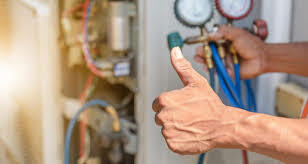As a homeowner in Southlake, TX, you depend on your HVAC system to maintain comfort throughout the year. Whether it's the scorching summer heat or the chilly winter months, your heating, ventilation, and air conditioning system plays a pivotal role in keeping your home comfortable. However, like any mechanical system, HVAC units can experience wear and tear, leading to the need for repairs. Being able to recognize the signs that your HVAC system needs attention is crucial in preventing costly breakdowns and ensuring your system runs smoothly year-round.
Inconsistent Temperature or Poor Airflow
One of the most obvious signs that your HVAC system needs repair is inconsistent temperatures or poor airflow throughout your home. If certain rooms are hot while others are cold, or if you notice that your system is struggling to keep the house at the set temperature, something may be wrong. Clogged filters, broken fans, or issues with the ductwork could all be to blame for this problem.
If the airflow feels weak or doesn’t seem to reach every part of your home, there could be an issue with the blower fan or the ductwork, which can lead to uneven cooling or heating. In such cases, it’s best to schedule an inspection with an HVAC repair technician in Southlake, TX.
Strange Noises Coming from Your HVAC Unit
Your HVAC system should operate relatively quietly. If you begin hearing unusual sounds like grinding, squealing, or rattling, it could indicate a problem that requires immediate attention. For instance:
- Grinding noises could suggest a worn-out blower motor or a problem with the fan.
- Squealing sounds may point to issues with the fan belt or motor bearings.
- Rattling noises might be the result of loose or broken parts within the system, such as the blower wheel or internal components.
Regardless of the specific sound, any abnormal noise coming from your HVAC system should be addressed promptly by a professional technician.
Foul Odors
Strange or unpleasant odors coming from your HVAC system are another red flag that something is wrong. If you notice a musty smell, it could be a sign of mold growth inside your ducts or air handler, which could affect your indoor air quality and health. A burning smell may indicate that your HVAC system is overheating, or that electrical components are failing. In either case, it’s important to turn off the system immediately and call an HVAC technician for a thorough inspection.
Frequent Cycling or Short Cycling
If your HVAC system frequently turns on and off, or cycles more often than usual, it could be a sign of an underlying issue. This issue, known as "short cycling," often results from problems like a malfunctioning thermostat, clogged air filters, or low refrigerant levels. In most cases, short cycling reduces your HVAC system’s efficiency, increases energy bills, and places undue stress on the system, potentially leading to a full breakdown. If this occurs, it’s important to contact an HVAC professional in Southlake, TX, to diagnose and resolve the issue.
Increased Energy Bills
An unexpected spike in your energy bills, especially during peak cooling or heating seasons, can be a sign that your HVAC system is not functioning efficiently. Several factors could contribute to this, such as clogged filters, refrigerant leaks, or a system that is too old and struggling to meet your home’s needs. Even if your system is still running, it could be consuming more energy to maintain the temperature in your home.
If your energy bills are rising without a corresponding increase in usage, it’s time to have your HVAC system inspected by a professional repair service. By addressing the root cause, you can improve efficiency and reduce energy costs in the long run.
Leaks or Excess Moisture Around the Unit
Your HVAC system contains various components that use refrigerant, and when there's a refrigerant leak, you may notice signs of moisture around the indoor unit or evaporator coils. This could lead to water damage or mold growth, both of which can further damage your HVAC system and affect your indoor air quality.
Water pooling around your HVAC system can also indicate a clogged condensate drain line or a malfunctioning pump. Excess moisture can lead to costly repairs and significant water damage if not addressed immediately, so be sure to schedule HVAC repair in Southlake, TX, if you spot any leaks or moisture buildup.
Your HVAC System is Over 10-15 Years Old
While regular maintenance can extend the lifespan of your HVAC system, even the best-maintained units have a limited lifespan. If your HVAC system is over 10–15 years old and you're experiencing frequent breakdowns or repair needs, it may be time to consider replacement. Older units tend to become less efficient, and the cost of frequent repairs may add up over time.
An HVAC professional can assess the condition of your unit and provide guidance on whether it’s time for a replacement or if repairs are still a viable option. Installing a new, energy-efficient HVAC system could save you money in the long run by improving efficiency and reducing energy consumption.
Increased Humidity Levels in Your Home
Your HVAC system plays a critical role in regulating indoor humidity levels. If you notice that your home feels unusually damp or humid, it could be a sign that your air conditioner is not dehumidifying the air properly. Issues like a dirty evaporator coil, low refrigerant, or a faulty thermostat can all contribute to increased humidity, making your home uncomfortable.
Increased humidity can also lead to mold growth, poor air quality, and an overall unhealthy environment. If you notice this problem, it’s important to have your HVAC system inspected and repaired to restore proper humidity control.
Conclusion
HVAC issues can arise unexpectedly, but recognizing the early signs of a malfunction can help you address problems before they escalate into more expensive repairs. If you notice any of these issues with your HVAC system in Southlake, TX, don't hesitate to reach out to a trusted professional for repair services. At HVAC Repair Southlake, TX, we provide expert HVAC repair and maintenance services to ensure your system stays in top working condition all year long. Keeping your HVAC system in good shape not only improves comfort but also enhances energy efficiency and prolongs the life of your system.
FAQs
1. How do I know if my HVAC system needs repair?
Signs that your HVAC system needs repair include inconsistent temperatures, poor airflow, strange noises, foul odors, increased energy bills, frequent cycling, leaks or moisture around the unit, and higher humidity levels inside your home. If you're experiencing any of these issues, it’s time to schedule an inspection with an HVAC professional.
2. Why is my HVAC system making strange noises?
Strange noises like grinding, squealing, or rattling can indicate various issues. Grinding sounds may point to a worn-out blower motor or fan. Squealing noises could suggest problems with the fan belt or motor bearings. Rattling could be due to loose parts inside the unit. A technician can pinpoint the cause and recommend the appropriate repairs.
3. How often should I get my HVAC system serviced?
It’s recommended to have your HVAC system serviced at least once a year—ideally in the spring before the cooling season begins and in the fall before the heating season starts. Regular maintenance helps ensure the system operates efficiently and can prevent unexpected breakdowns.
4. Can I repair my HVAC system myself?
While some minor issues, such as changing filters, can be handled by homeowners, HVAC systems are complex and require professional training to diagnose and repair properly. Attempting DIY repairs can lead to further damage or even void your warranty. It’s best to call a licensed HVAC technician for repairs.
5. How much does HVAC repair cost in Southlake, TX?
The cost of HVAC repair depends on the nature of the problem, the type of system you have, and the parts that need to be replaced. On average, repairs can range from $150 to $1,000 or more. A professional technician can provide a more accurate estimate after assessing the condition of your system.



